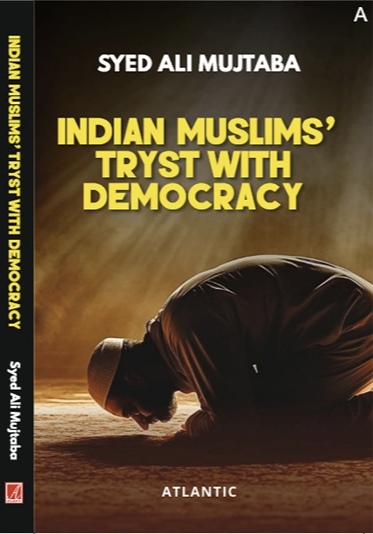“Indian Muslims’ Tryst with Democracy” by Syed Ali Mujtaba
Book Review: Ayesha Sultana
Syed Ali Mujtaba’s latest work, Indian Muslims’ Tryst with Democracy, offers a comprehensive exploration of the challenges and aspirations of Indian Muslims within the framework of the nation’s democratic ethos. As his sixth publication, Mujtaba—a seasoned journalist, academic, and filmmaker with a PhD from Jawaharlal Nehru University—delivers a nuanced narrative that intertwines historical context with contemporary analysis.
Historical Context and Contemporary Challenges
The book commences with an examination of Mohammad Ali Jinnah’s foresight regarding the potential challenges Muslims might face in a Hindu-majority democratic India. Mujtaba traces the trajectory from the colonial era, highlighting pivotal moments such as the Simla Deputation of 1906, to the present-day socio-political landscape. He delves into the erosion of secularism and the rise of majoritarianism, particularly post-2014, where policies and societal shifts have increasingly marginalized Muslim communities.
Structural Overview
Structured into 15 chapters, the book systematically addresses various facets of Muslim life in India:
Electoral Representation: Analyzing the diminishing presence of Muslims in legislative bodies and the implications thereof.
Public Policy and Governance: Assessing how governmental decisions have impacted Muslim communities, often sidelining their needs and contributions.
Media Representation: Critiquing the portrayal of Muslims in mainstream media, which often perpetuates stereotypes and fuels communal tensions.
Leadership Crisis: Discussing the vacuum in effective Muslim leadership and its consequences on community mobilization and advocacy.
Notably, Chapter 13 draws parallels between the current status of Indian Muslims and the historical experiences of Muslims in 16th-century Spain, offering a comparative lens to understand systemic marginalization.
Strategic Roadmap for Empowerment
Mujtaba doesn’t merely highlight challenges; he proposes actionable strategies for empowerment:
1. Political Engagement: Encouraging Muslims to actively participate in the democratic process, understanding the “game of numbers” to influence policy and representation.
2. Educational Advancement: Emphasizing the importance of education in achieving socio-economic mobility and breaking cycles of poverty.
3. Grassroots Mobilization: Advocating for community-level initiatives to foster unity, awareness, and collective action.
Critical Acclaim and Publication Details
The book has garnered attention for its candid analysis and timely relevance. Published by Atlantic Publishers & Distributors Pvt. Ltd. For inquiries, readers can contact Aparna Gupta at aparna@atlanticbooks.com or call 011-40775252.
Conclusion
Indian Muslims’ Tryst with Democracy is a pivotal contribution to the discourse on minority rights and democratic participation in India. Mujtaba’s insightful analysis serves as both a mirror and a roadmap, reflecting the current state of affairs while guiding towards a more inclusive and equitable future.




